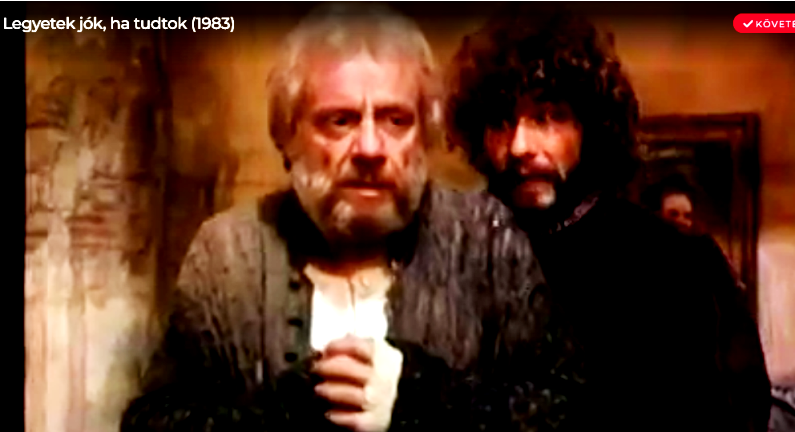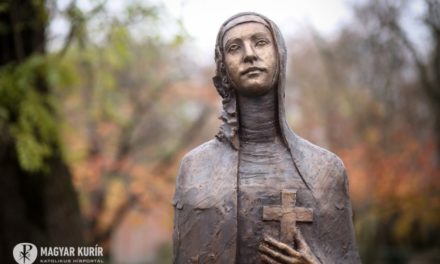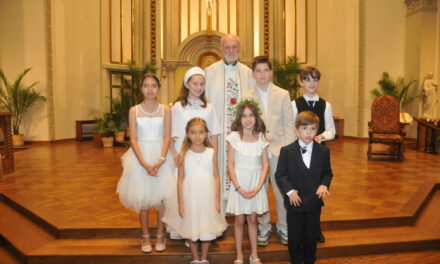On his liturgical memorial day, May 26, we remember St. Fülöp Néri
Philip was born on July 21, 1515 in Florence. The little "Pippo buono" was everyone's favorite, he was characterized by directness, rich imagination and great enthusiasm. He had an extraordinary sense of humor. A kind of radiant purity poured over his form. He lost his mother at an early age, and his father, being poor, sent him to study with his uncle, who was a rich merchant. He learned a trade under him, but then went to Rome to study philosophy and theology. In his free time, he visited the churches and monuments of the eternal city. He often spent the night praying in a church. His inner life remained God and his secret.
During the presentation of the Holy Mass, he spent hours in rapture. He also received extraordinary visions, the most famous of which was when, in 1544, while deep in intimate prayer, he saw that something great, a ball of fire, was approaching him and, burning his lips, penetrated to his heart. He fell to the ground and had to tear the clothes off his chest from the heat of the fire. Meanwhile, he stammered: "Stop it, Lord, this is too much!" His whole body trembled, and when he put his hand over his heart, he felt a fist-sized swelling that never went away. From then on, the smallest thought about God caused such a beating in Philip's heart that those around him could also hear it. After his death, the all-encompassing medical examination recorded in the report that his heart was greatly enlarged: " his heart is as big as has never been seen in any human".
Szent Fílóp Néri established the Szentháromság Tesvérület, which dealt with the care of pilgrims. He was ordained a priest in 1551. At the beginning of his priesthood, he founded the Oratory, the place where they prayed and organized meetings. Artists, merchants, all kinds of residents of the city came, even priests, with whom Philip later founded the Congregation of Oratorians, which received papal approval in 1575. The extraordinary personality of the founder and the spirit that characterized the Oratory attracted people with such force that those who once crossed its threshold always returned.
The unprecedented style of pastoral care and the new face of piety gripped people so much that they couldn't tear themselves away from it. The members of the Oratory created a community of living faith and authentic joy. These were the four basic principles of Saint Philip's spiritual leadership: to despise yourself, to despise the world, not to despise anyone else, not to care about the contempt of others. Her attraction was the joy that radiated from her.
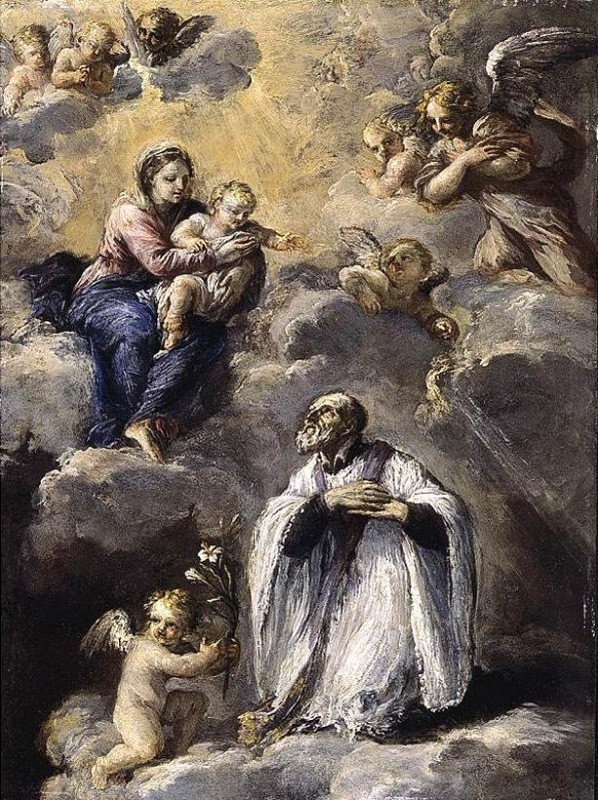
Ludovico Stern: Saint Philip of Néri (18th century)
He dedicated his days to street evangelism in Rome. He didn't give scolding speeches to people, he preferred to start a cheerful conversation with the street vagrants, the Florentine merchants, the owners of small shops and the poor artists. He began wittily and with a folk saying, and then, seeing their hearts open, he suddenly asked: "When will we finally muster up the courage to start doing something good? We can't delay it, because death doesn't delay either!"
He was happy to be with mischievous youths on the street or outside. Often the whole team filled his room. When they were making noise during the game, Fülöp said with a laugh: "If they don't commit a crime, they can even split a tree on my back!"
"He was almost always seen in the company of street children and rags. The source of his spiritual strength was prayer. He built the lovely and serviceable building of his individuality on the foundations of prayer and joy." (Péter Varnai)
In a convent near Rome there was a nun who was said to have supernatural visions and ecstasies. The papal authority commissioned Fülöp to investigate the matter. Philip went out there on foot in bad weather. They called the nun, and Philip, without greeting her, held out his muddy boots for her to take off. The nun retaliated and protested with fierce words against the outrageous request. Then Fülöp calmly stood up: "It's not even important to pull it off anymore! I have completed my task," he said, and immediately returned to his clients. "That woman is not a saint," he informed them, "and she does not perform miracles, because she lacks the most important thing, humility."
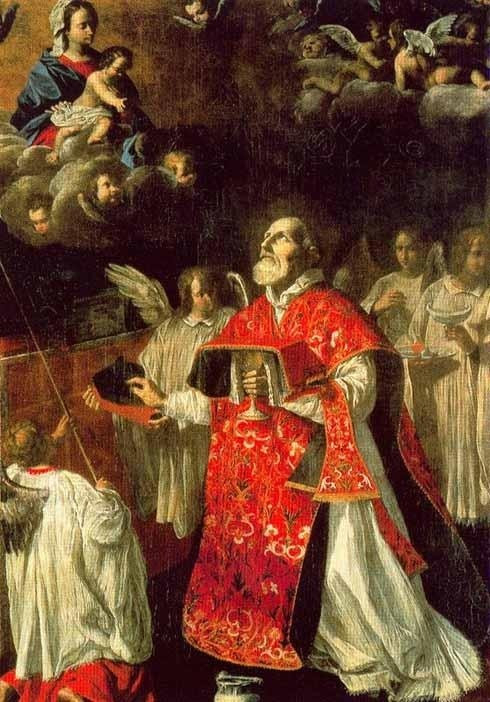
Cristoforo Santanna: The Holy Spirit appears to Philip (1792)
When they wanted to venerate him as a saint already in his lifetime, he vehemently protested against it and tried to behave frivolously. In order to reduce the great respect with which people approached him, and to humiliate himself, he more than once played the miracle bug, even the fool. Sometimes he put on his clothes inside out, and at other times he was seen holding a bunch of thistles in his hand and stopping to sniff them with maddened delight. He danced in public squares and drank wine from a bottle. He cut his beard off only on one side of his face and walked among people jumping and dancing half-shaven.
When his virtues were praised, he prayed to himself: “Lord, do not trust Philip. If you would deprive me of your graces, I would perish today and commit all the sins of the world!”
Although his behavior banned him from pastoral work for a few years, the Romans who knew him perfectly understood the reason for his irony and way of life. That is why he was called the "mystic in clown's clothes" and the "Socrates of Rome". This is how Fülöp Néri, from Florence, became the "Second Apostle of Rome".
At the end of his long illness, on the morning of May 25, 1595, his Lord's day, he presented his last Mass "joyfully and singing". No one but him thought of his imminent death. However, in the evening he said with a smile to his roommates: "I must die now." Then he went to bed. "Are not you afraid of?" asked one of the brothers. Philip shook his head and said cheerfully, “I am not afraid. God is good. He will be a little sorry for his stupid and useless Philip.” In the evening, as always, all the brothers visited him, received his blessing, and on May 26 at three o'clock in the morning, Fülöp died. His relics are in the church of Santa Maria in Vallicella (Chiesa Nuova) in Rome.
His canonization process began two months after his death. canonized on March 12, 1622, Ignatius of Loyola , Ferenc Xavier and Terez of Avila His holiday was added to the Roman calendar in 1625, on May 26.
Our God, you always honor your faithful servants with the glory of sanctity of life. Ignite in us also the fire of the Holy Spirit, which permeated the heart of St. Philip Néri so wonderfully. Through our Lord Jesus Christ, your Son, who lives and reigns with you in unity with the Holy Spirit, God forever and ever. Amen.
A wonderful film was created about the life of St. Fílóp Néri. The film "Be good if you can" can be viewed here.
Source: Magyar Kurir/István Diós: The lives of the saints (Hungarian Catholic lexicon)
(In title image: Screenshot from the movie )

